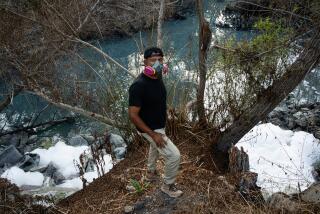Torrance Seeks State Safety Study of Trains With Hazardous Cargo
- Share via
Alarmed by the shipment of hydrofluoric acid over railroad tracks through Torrance, City Council members Tuesday asked state officials to study whether the practice is safe.
The council’s unanimous resolution asks the California Public Utilities Commission to conduct a safety evaluation of the railroad’s movement of hazardous materials, a standard procedure that involves studying the condition of the tracks, the rail cars and locomotives used and the safety practices employed.
City Atty. Kenneth Nelson said he decided to recommend turning to the commission for help because his initial legal research indicates that federal and state commerce laws prevent Torrance from exercising any control over the railroads.
“Any supplementary city ordinances would probably run afoul of the federal constitutional limitations on local agencies’ imposing undue burdens on interstate commerce,” Nelson said in a written report to the council.
Asking for a state review of the Santa Fe and Southern Pacific railroad lines in the city may be the city’s only recourse, he said.
“In our opinion, this would be a significant, practical and cost-free (to the city) way of minimizing such hazard,” Nelson said in his report.
The city’s concerns center on railroad cars bound for Allied-Signal’s El Segundo plant. Twice a week, a car loaded with nearly 22,000 gallons of hydrofluoric acid leaves an Allied-Signal manufacturing plant in Louisiana. In the South Bay, the route follows an Atchison Topeka and Santa Fe Railway line through Torrance, Lawndale, portions of Redondo Beach and Hawthorne and into the company’s El Segundo facility.
The council learned how Allied-Signal transports its hydrofluoric acid in a brief memo in January from Torrance Fire Chief Scott Adams. He said he became curious about how the company receives the chemical after seeing statistics showing that it consumes 4,320 gallons each day--more than nine times the consumption rate at Mobil Oil’s Torrance refinery.
Mobil’s use of the substance has been under attack in the city. Next Tuesday, Torrance residents will be asked to vote on whether bulk storage of hydrofluoric acid should be banned.
Although a PUC evaluation of the railroad’s movement of hazardous materials probably would not lead to an outright ban of the practice, Nelson and Adams said they think it could ensure that it is done as safely as possible.
“We don’t have railroad cars falling off the tracks every day, so we’re not saying anything is unsafe right now,” Adams said. “But it’s a very good idea to take a close look at it.”
More to Read
Sign up for Essential California
The most important California stories and recommendations in your inbox every morning.
You may occasionally receive promotional content from the Los Angeles Times.













